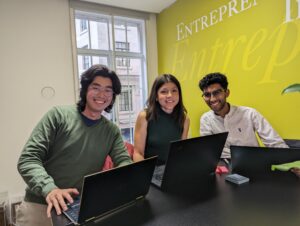
Founding a startup alongside your PhD: a Q&A with Edwin Wong
Edwin (left of the photo) is a final-year PhD candidate at the NUS Department of Pharmacology and King’s College London (co-supervisors Prof Allan Young and A/Prof Gavin Dawe). He’s also co-founder and CEO at Psyrin, a venture-backed startup developing objective biomarkers for serious mental illness. Here, he offers some reflections on his journey to date.
Q: Can you share with us a little about your journey founding Psyrin?
A: It was really a string of good fortune – I started going to a bunch of startup events and met some great founders. I was inspired enough to host an event, where my eventual co-founders showed up! We were all working in mental health, so there was an easy ‘click’. On a whim, we pitched an idea at a university “idea competition” and ended up winning! From there, we just started having a ton of conversations. It took a lot of active seeking of opportunity but just as much luck.
Q: When and how did you realize that founding a startup was possible? Where did you learn the fundamental tools?
A: It was a leap of faith. There’s no threshold where you’re suddenly ready. Getting some external validation of our core principles helped, but by then, we’d already committed to building a startup. People often wait for an idea, but a startup is far more about execution and iterative thinking, so there’s no point obsessing over the “right” idea. Ultimately, founding a startup is always a possibility; it just takes some faith and determination to commit.
Q: Academia and entrepreneurship seem vastly different – how did you adapt to this transition?
A: I approached it by immersing myself in the world of startups (it’s smaller than you think!) There are tons of online resources – Y Combinator lectures, blogs by legends like Paul Graham, industry pieces by investors, etc. Pair that with non-stop interaction with other founders (especially academic founders), and the transition becomes quite natural. It helps that the two worlds are not actually that different – it’s a different mentality, but the skill overlap is strong.
Q: Balancing the demands of a PhD program with a startup sounds challenging – how did you manage this effectively?
A: Sadly, I don’t have a clear, step-by-step answer to this, but I want to emphasize that it is absolutely possible! It’s been helpful to set clear milestones, both with the PhD and the startup. I also rely heavily on Google Calendar, blocking out time and recording this explicitly. I’m also lucky to have supportive supervisors who trust me to get my work done; it’s so important to have them on board!
Q: What were some of the key challenges you encountered while building your startup?
A: The first thing that comes to mind is all the rejection. I expected some rejection – but the sheer volume was shocking. It’s why I’m so grateful for a great support system that keeps me optimistic. It’s also challenging to balance idealism and pragmatism. A lot of what we do is aspirational and disruptive, but it’s so important to keep your user (and customer) in mind, a process that’s not necessarily intuitive.
Q: Did you find your PhD training helpful while building Psyrin?
A: There is certainly overlap, it’s why academics often make great founders! This is a bit cliche, but a PhD really does foster soft skills – resilience, persistence, critical thinking – that translate to a startup. Plus, the actual work overlaps. At Psyrin, I’ve written grants, coordinated partnerships, and made tons of presentations, just like academics do!
Q: And finally, what advice would you have for a new PhD student thinking about founding a startup?
A: Go for it! Nothing is stopping you. There are a million reasons not to start a startup – but most either don’t matter or aren’t worth worrying about. If you want to start smaller, I’d encourage talking to founders. It costs nothing to approach people, whether that’s at one of many events (there are several in Singapore!) or over a cold LinkedIn message.
